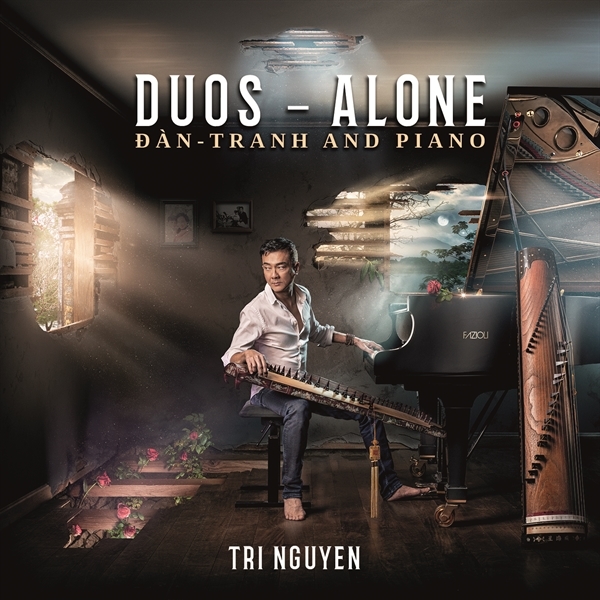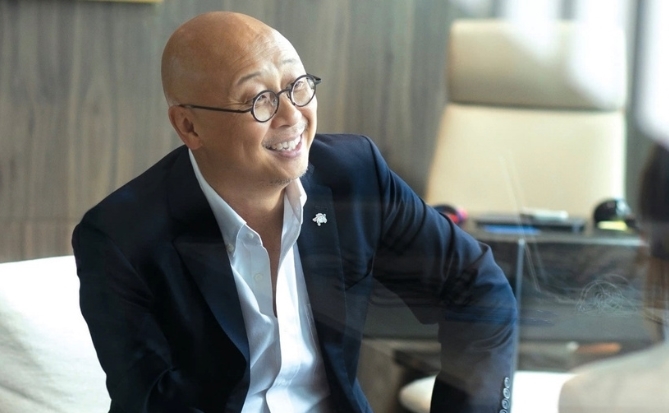Acclaimed zitherist combines traditional Vietnamese sounds with classical music

Tri Nguyen's sound is manly, elegant, discreet but also very liberal and romantic, so it is highly appreciated by international experts. Photo: TL
Tri Nguyen has become famous for bridging two beautiful music traditions. Passionate about traditional Vietnamese music, he is a highly respected classical artist. His Consonances album delightfully blends the traditional sounds of Vietnam with a classical string quartet, creating truly exquisite music.
When playing the dan tranh, the musician still uses the old annotation. He uses Western annotation when performing on the piano. Tri Nguyen says that when he plays his 16-string zither, he feels affection and understanding, even in exile.
International experts have praised Tri Nguyen for his delicate, romantic zither tone. Tri Nguyen has published four CDs of dan tranh performances with Western instruments: Consonances (Harmony, 2014), A Journey Between Worlds (Traveling around the World, 2016), Beyond Borders (2016), and Beyond Borders (2016). Crossing All Borders (2017), and Hometown Wind (2020) have also been published.
In 2015, the Global Music Awards (GMA) awarded "Consonances" a gold prize, and in 2017, Beyond Borders also won gold. Walking, performed with Canadian music producer and percussionist Graeme Drum, won the Independent Music Awards (IMA) 2020 World Beat Song category.
Tri Nguyen believes that the dan tranh has all the qualities to be performed on stages worldwide, and always composes music where the đàn tranh has the lead part.
After the album Consonances, will your new album combine the zither with Western instruments?
Consonances features the dan tranh and a string quartet. His other albums include the đàn tranh collaborating with bagpipes, the Weissenborn guitar, the Arabic Oud, etc. I always put the dan tranh in a leading position, even with other international instruments. Duos-Alone is my next album. Thanks to technology, I play both the dan tranh and piano at the same time on the new record, making me "alone" for the first time.
What motivated you during many years of combining traditional musical instruments, specifically the zither with Western instruments?
I am fortunate to understand two worlds of music, East and West, dan tranh and piano, thanks to a solid upbringing in my family. The intersection between the two instruments is fairly obvious. In all fields, not only music, I think that if you want to combine anything from two different worlds, you need to have 100% knowledge of both.
The second reason that motivates me stems from so-called national pride. While living in France, I noticed that when it comes to Asian musical instruments, people often only know about the Koto, the Gayageum, or the Guzheng (Chinese classical) instead of the Vietnamese zither. Even when they see me playing the Vietnamese zither, many people confuse it with other types of lutes.
Music promotion in Vietnam is far behind Korea, Japan, and China, which saddens me. My knowledge of both Western and Eastern music has made things easier to combine both. I'm delighted that my tireless efforts have helped the dan tranh have more popularity and market share.
Westerners call Chinese, Korean, and Japanese instruments by their original names. But the word the dan tranh is referred to as “the Vietnamese Zither”. In my debut album, I invited foreign producers to use "dan tranh" to draw attention to and familiarize people with these two in my album.
 |
|
The album Duos Alone is expected to be released worldwide in August 2023. For the album, Tri Nguyen collaborated with Naxos Records, one of the world's leading labels for classical music, and World Music. File photo |
Does the shadow of Eastern music, especially Chinese instruments, obscure the influence of Vietnamese traditional music?
In fact, the Vietnamese zither originated from China’s Guzheng. Dan tranh was introduced to Vietnam during the Tran Dynasty. However, after more than 1,000 years, Vietnam has established its own musical orientation in the way of playing the dan tranh and a completely Vietnamese way of tuning. If we make a comparison with instruments in the zither family such as Guzheng, Koto, Yatga (Mongolia), and Gayageum, the left-hand technique of the Vietnamese zither needs more skill. Dan tranh is even more difficult and challenging to play.
Sadly, dan tranh players now imitate the Chinese way of playing, not even learning the zither but learning the Guzheng. I think that it is not Chinese musical instruments or music that obscures Vietnamese traditional music, but it is Vietnamese friends who are forgetting the music of their own country and of their people.
Last year, during my trip to Can Tho city in the Mekong Delta, I had a chance to meet senior dan tranh artists, who shared my sadness that the technique of playing the Vietnamese zither has gradually disappeared.
So how can this situation be remedied?
In my opinion, it is advisable to invite the old masters to teach in national music departments, to strengthen the foundation. In traditional music schools, it is necessary to bring the old harmonies from the Tu Tuyet and Ngu Tuyet groups for young people to master. Once you have mastered the basics, you can freely choose the path and music you want to pursue. In Europe, when entering school, learners must master classical schools first, then choose Jazz, Pop, or contemporary music. Vietnamese people are smart and talented, so as long as they have a solid foundation and a genuine national basis, the music will prosper.
In your opinion, how can traditional music, specifically that which uses traditional Vietnamese instruments, become more popular in the world?
Must have quality, must understand music, must have a mind, must have a soul, and must have a way. That is, only playing is not enough; it is necessary to know how to promote and share with international listeners so they understand what musicians do, play, and why they play like that. If there are just a few troupes of trumpets and drums doing a fan dance or cup dance, the guests will forget after watching.
Having quality and musical know-how means the identity must be strong. If we want it to be strong, we must have knowledge. Not long ago, I happened to see a promotional poster for the Vietnamese delegation that was going to perform in Europe. I realized that the poster should have said, “Concerto played with the Vietnamese two-chord (dan nhi)”, but the poster actually said "Erhu Concerto". Erhu is a Chinese two-stringed bowed musical instrument, but they used that word for the Vietnamese dan nhi.
Using the name of a Chinese musical instrument for a Vietnamese musical instrument leaves Vietnamese traditional music with no position in the world of music. To help foreigners listen to, understand, and like Vietnamese music, Vietnamese musicians should understand the music of other cultures.
|
Tri began studying piano at age five and a half in Vietnam with French-trained teachers. After graduation from the Music Conservatory of Saigon, he continued his studies at the Ecole Normale de Musique de Paris with renowned professors such as Jacques Lagarde, himself a former student of Marguerite Long and Clara Haskil; and then Ramzi Yassa, a concert virtuoso trained in Moscow, with whom he discovered the great Russian school. |
Same category news
-
Architect Pham Minh Nhut

 TIẾNG VIỆT
TIẾNG VIỆT 








_131447820.png)








